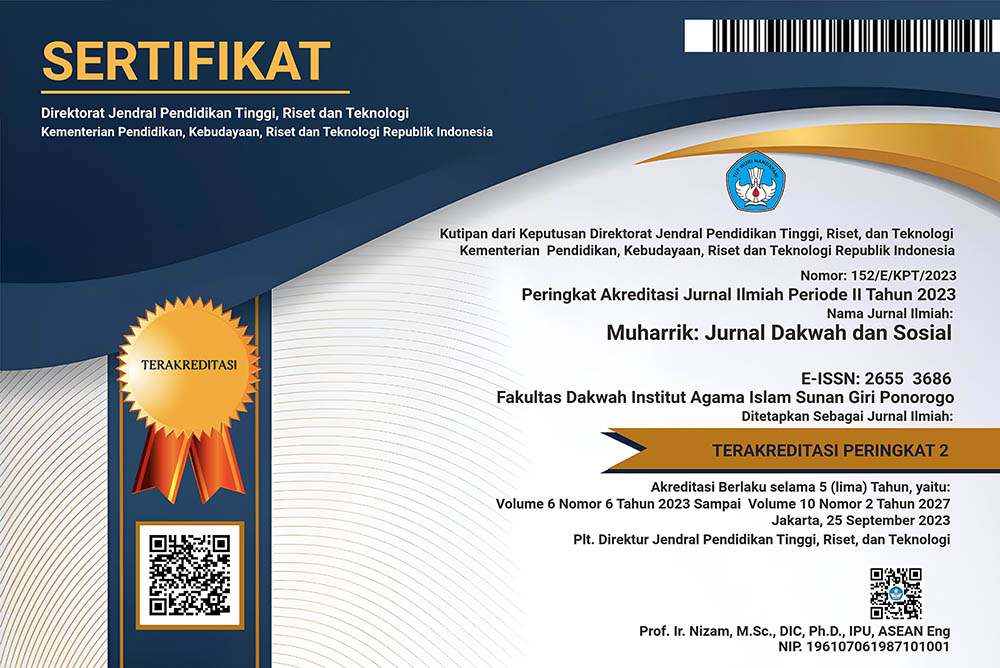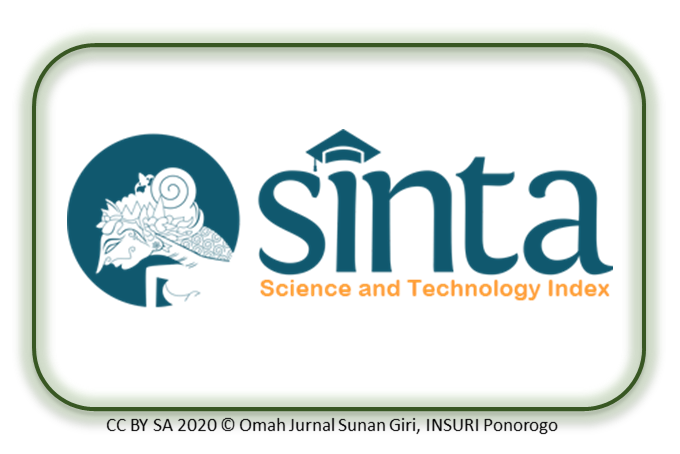Kyai, Secret Married and Social Legitimacy: Marriage Practices in Rembang, Pasuruan, East Java
Keywords:
Secret marriage, Kyai’s authority, Social legitimacy, Legal Pluralism, Islamic Marriage LawAbstract
This article examines the practice of secret marriage in Pekoren Village, Rembang District, Pasuruan Regency, East Java, with a focus on the central role of the kyai (Islamic cleric) in legitimizing the practice. Using a qualitative approach and ethnographic methods, this study explores how local religious authority constructs, negotiates, and sustains social legitimacy for marriages that are not legally recognized by the state. The study finds that the authority of the kyai is neither singular nor absolute, but shaped through complex social, symbolic, and economic relationships. Secret marriage occurs in various contexts, including late-life marriages, suspended marriages due to age restrictions, and polygamous marriages without official permission. The kyai serves as a mediator between religious norms and state legal pressures, offering religious legitimacy when the formal legal system is perceived as inadequate. This article shows that state law and local norms intersect through a space of compromise maintained by cultural-religious authority. Drawing on Khaled Abou El Fadl’s theory of authority and Max Weber’s theory of social action, the article underscores the importance of understanding legal pluralism and social authority in grassroots family law practices in Indonesia.
References
AB, K. (2023, June 14). Interview [Personal communication].
al-Sha>bu>ni, M. A. (1999). Tafsîr Âya>t al-Ahka>m min al-Qur’a>. Dar al-Kutub al-’Ilmiah.
Alfarisi, S. (2018a). Komersialisasi Nikah Siri di Desa Pekoren Kecamatan Rembang Pasuruan Jawa Timur. AL-HUKAMA: The Indonesian Journal of Islamic Family Law, 8(1), 169–193.
Alfarisi, S. (2018b). Komersialisasi Nikah Siri di Desa Pekoren Kecamatan Rembang Pasuruan Jawa Timur. Al-Hukama’: The Indonesian Journal of Islamic Family Law, 8(1), Article 1. https://doi.org/10.15642/al-hukama.2018.8.1.169-193
Al-Hammam, M. I. A. al-Wahid. (1984). Syarah Fath Al-Qadir (Vol. 3). Mathaba’ah al-Khubra.
Ali, Z. (Ed.). (2012). Hukum perdata islam di Indonesia. Sinar Grafika.
Al-Syarkhasiy, S. al-Din. (1989). Al-Mabsuth. Dar al-Fikr.
Anshori, A. G. (2011). Hukum Perkawinan Islam: Perspektif Fikih Dan Hukum Positif. UII Press.
Baihaqi, B., Tutik, T. T., Musadad, A., Khazin, A. M., & Simun, M. G. bin. (2024). Legal Non-Compliance and Kiai Hegemony: The Practice of Unregistered Marriages among the Madurese Muslim Community of Kubu Raya. Journal of Islamic Law, 5(2), Article 2. https://doi.org/10.24260/jil.v5i2.2819
Benisheikh, B. I. S., Sandabe, A., & Dunoma, Y. A. (2025). Family Dispute Mediation (Sulh) in Islamic Family Law: An Overview of Its Validity and Practice. Journal of Customary and Religious Law, 2(1), 48–65.
Bryan S, T. (2012). Teori Sosial dari Klasik sampai Postmodern. Pustaka Pelajar. http://repo.apmd.ac.id/id/eprint/1398
Datilah, I., & Bastian, Z. (2022). Tradisi Kawin Gantung di Jawa Barat dalam Perspektif Perlindungan Hak Anak di Bawah Umur. Journal of Law, Society, and Islamic Civilization, 10(1), 33–47.
Diab, A. L. (2018). Legalisasi Nikah Sirri Melalui Isbat Nikah Perspektif Fikih ( Telaah Terhadap Kompilasi Hukum Islam). Al-’Adl, 11(2), 36–61. https://doi.org/10.31332/aladl.v11i2.1248
Fadl, K. A. E. (2001). Speaking in God’s Name: Islamic Law, Authority and Women. Oneworld Publications.
Faishol, I. (2019). Implementasi Pencatatan Perkawinan di Indonesia (Studi atas Undang-Undang Perkawinan No. 1 Tahun 1974). Ulumul Syar’i : Jurnal Ilmu-Ilmu Hukum Dan Syariah, 8(2), Article 2. https://doi.org/10.52051/ulumulsyari.v8i2.53
Fajri, D., & Novira, F. (2023). The Phenomenon of Unregistered Marriages: Problems and Solution. Kosmik Hukum, 23(2), 180. https://doi.org/10.30595/kosmikhukum.v23i2.18113
Fakhria, S., Mustofa, K. N., Ma’mun, M., Wahidi, A., & Rachmatulloh, M. A. (2024). Securing Muslim Children’s Civil Rights: Debate on State Legal Policy towards The Issuance of Family Cards for Unregistered Marriage Couples. El-Mashlahah, 14(2), 303–322. https://doi.org/10.23971/el-mashlahah.v14i2.8008
Farabi, A. (2020). The State Penghulu vs The Non-State Penghulu: The Validity and Implementing Authorities of Indonesian Marriage. Justicia Islamica, 17(2), Article 2. https://doi.org/10.21154/justicia.v17i2.2180
Fauzan, P. I., & Fata, A. K. (2018). Positivisasi Syariah di Indonesia, Legalisasi atau Birokratisasi? Jurnal Konstitusi, 15(3), 592–615.
Fauzi, M. L. (2019). Registering Muslim Marriages: Penghulu, Modin, and the Struggles for Influence. Al-Jami’ah: Journal of Islamic Studies, 57(2), 397–424. https://doi.org/10.14421/ajis.2019.572.397-424
Fauzi, M. L. (2023). Administrative Transgression and Judicial Discretion for the Sake of Citizens’ Rights: The Legalisation of Unregistered Marriages in Indonesia. Al-Ahwal: Jurnal Hukum Keluarga Islam, 16(2), 211–231. https://doi.org/10.14421/ahwal.2023.16202
Gadjong, A. S. A. (2008). Dialektika Hukum dan Kekuasaan. Yalkindo Press.
Gavin W. Jones, Heng Leng, C., & Mohamad, M. (Eds.). (2009). Chapter 4. LEGAL ASPECTS OF MUSLIMNON- MUSLIM MARRIAGE IN INDONESIA. In Muslim-Non-Muslim Marriage (pp. 102–138). ISEAS Publishing. https://doi.org/10.1355/9789812308221-007
Hallaq, W. B. (2001). Authority, Continuity and Change in Islamic Law. Cambridge University Press.
Hasibuan, M. (2012). Manajemen Sumber Daya Manusia. PT Bumi Aksara.
Horii, H., & Wirastri, T. D. (2022). Living in a Legal Limbo: Mechanisms to “Fix” The Legal and Social Positions of Unregistered Children in Indonesia. The Indonesian Journal of Socio-Legal Studies, 2(1). https://doi.org/10.54828/ijsls.2022v2n1.1
Ilma, M. (2020). Regulasi Dispensasi dalam Penguatan Aturan Batas Usia Kawin bagi Anak Pasca Lahirnya UU No. 16 Tahun 2019. AL-MANHAJ: Jurnal Hukum Dan Pranata Sosial Islam, 2(2), Article 2. https://doi.org/10.37680/almanhaj.v2i2.478
Irfan, M. I. (2017). Ambiguitas Pasal 2 Uu No 1 Tahun1974: Sebuah Bentuk Diskriminasi Hukum. Al-’Adalah, 9(1), 343–352. https://doi.org/10.24042/adalah.v10i1.284
JZ, M. (2023, July 19). Interview [Personal communication].
Lasswell, H. D., & Kaplan, A. (2014). Power and Society: A Framework for Political Inquiry. Transaction Publishers.
Lili Rasjidi, A. (1990). Dasar dasar filsafat hukum / Lili Rasjidi. Universitas Indonesia Library; Citra Aditya Bakti. https://lib.ui.ac.id
Mafaid, A. M. (2020). Kecakapan Menerima Hak Dan Melakukan Perbuatan Hukum Dalam Tinjauan Ushul Fiqh. El-Ahli : Jurnal Hukum Keluarga Islam, 1(1), 88–102. https://doi.org/10.56874/el-ahli.v1i1.66
Manan, A. (2006). Aneka Masalah Hukum Perdata Islam Di Indonesia. Kencana.
MD, K. (2023, June 17). Interview [Personal communication].
Muzakki, M. H., Nurlaelawati, E., & Wahib, A. B. (2024). Transformation of Kyai Authority in Marriage: A Law-Abiding Society in Pekoren, Rembang, Pasuruan. Justicia Islamica, 21(2), 267–290. https://doi.org/10.21154/justicia.v21i2.9492
Nazarudin, Abubakar, A., & Basri, H. (n.d.). Nikah Sirri dan Problematikanya. INNOVATIVE: Journal Of Social Science Research, 3(3), 4736–4750.
Novikawati, N., Rahman, F., Ramlah, R., & Zulkarnain, Z. (2022). Legalisasi Hukum Nikah Sirri pada Perkara Isbat Nikah di Pengadilan Agama Muara Bulian. Jurnal Manajemen Pendidikan Dan Ilmu Sosial, 4(1), 591–605.
Nuruddin, A., & Tarigan, A. A. (with Indonesia). (2004). Hukum Perdata Islam di Indonesia: Studi Kritis Perkembangan Hukum Islam dari Fikih, UU no. 1/1974, sampai KHI (1st ed.). Kencana.
Oktarina, S. (2022). The Impact of Siri Marriage Law Seen from Indonesian Criminal Law. Proceedings of the 2nd International Conference on Law, Social Science, Economics, and Education, ICLSSEE 2022, 16 April 2022, Semarang, Indonesia. Proceedings of the 2nd International Conference on Law, Social Science, Economics, and Education, ICLSSEE 2022, 16 April 2022, Semarang, Indonesia, Semarang, Indonesia. https://doi.org/10.4108/eai.16-4-2022.2320118
Oktaviani, O., & Sugitanata, A. (2020). Memberikan Hak Wali Nikah Kepada Kyai: Praktik Taukil Wali Nikah Pada Masyarakat Adat Sasak Sade. Al-Ahwal: Jurnal Hukum Keluarga Islam, 12(2), 161–171. https://doi.org/10.14421/ahwal.2019.12204
PA Bangil, H. F. (2023, June 7). Interview [Personal communication].
PA Bangil, H. R. (2023, June 15). Interview [Personal communication].
Pekoren, K. K. D. (2023, July 22). Interview [Personal communication].
Pekoren, M. D. (2023, July 24). Interview [Personal communication].
Rochman Firdian, M. (2022). Factors and Reasons That Influenced The Misyar Marriage Phenomenon in Surabaya Urban Communities. Journal of Social Science, 3(1), 137–146. https://doi.org/10.46799/jss.v3i1.284
Rozak, A., & Akbar, H. (2023). The Formalist vs Realist Constructs on Marriage Registration in Indonesia: A Study of the Perspectives of Kyai from Nahdlatul Ulama in Rembang. Al-Mazaahib: Jurnal Perbandingan Hukum, 11(2), 161. https://doi.org/10.14421/al-mazaahib.v11i2.3187
RS, U. (2023, June 17). Interview [Personal communication].
Saini, S. (2024). Mediasi Non-Litigasi: Mencapai Kesepakatan Damai Dalam Konflik Syiqaq Dan Nusyuz Untuk Keharmonisan Keluarga Perspektif Hukum Keluarga Islam. International Conference on Humanity Education and Society (ICHES), 3(1). https://proceedingsiches.com/index.php/ojs/article/view/195
Septiningsih, D. S., & Na’imah, T. (2012). Kesepian Pada Lanjut Usia: Studi Tentang Bentuk, Faktor Pencetus Dan Strategi Koping. Jurnal Psikologi, 11(2), 1–9. https://doi.org/10.14710/jpu.11.2.9
Suardiman, S. P. (2016). Psikologi Usia Lanjut. Gajah Mada University Press.
Sukiati, S., Harahap, Y., & Lubis, I. A. (2024). Juridical Analysis of the Implementation of Itsbat Nikah in the Principle of Legal Certainty in the Religious Court Decision Number 93/Pdt.p/2018/Pa.tte. ANAYASA : Journal of Legal Studies, 2(1), 75–82. https://doi.org/10.61397/ays.v2i1.182
Suryantoro, D. D. (2022). Pernikahan Dibawah Tangan (sirri) Perspektif Kompilasi Hukum Islam. SAMAWA : Jurnal Hukum Keluarga Islam, 2(2), Article 2. https://doi.org/10.53948/samawa.v2i2.57
Susanti, D. O. (2016). Urgensi Pencatatan Perkawinan (Perspektif Utilities). Rechtidee, 11(2), 166–181.
Syafi’i, I. (1990). Al-Umm (Vol. 5). Dar al-Fikr.
Talcott, P. (1937). The Structure of Social Action. Collier Macmillan Publishers.
Winarni, T., Nadirin, A., & Ismail, I. (2023). Pencatatan Perkawinan Sebagai Upaya Perlindungan Terhadap Perempuan dan Anak (Studi Kasus di Kantor Urusan Agama Kecamatan Weru). Mahkamah: Jurnal Kajian Hukum Islam, 8(2), 245–255.
Yapianto, L. (n.d.). Janda Dan Duda Usia Lanjut Yang Menikah Kembali (suatu Studi Deskripstif Pada Empat Orang Lanjut Usia).
ZK, U. (2023, July 5). Interview [Personal communication].
Downloads
Published
Issue
Section
License
Copyright (c) 2025 M. Harir Muzakki, Khaidarulloh Khaidarulloh, Soleh Hasan Wahid

This work is licensed under a Creative Commons Attribution-NonCommercial 4.0 International License.
The author(s) retain/s the copyright and grant/s Muharrik: Jurnal Dakwah dan Sosial the first publication rights licensed under the Creative Commons Attribution-NonCommercial 4.0 International (CC BY-NC 4.0) , which allows others to access (search, read, download and quote), share (copy and redistribute the material in any media or format) and adapt (mix, modify and develop) works for legitimate non-commercial purposes, with recognition of the authorship of the work and its initial publication in this journal.












